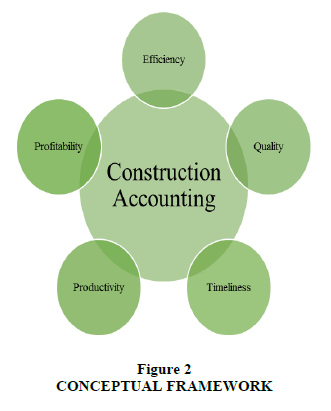Why Construction Accounting is Essential for Efficient Project Management
Why Construction Accounting is Essential for Efficient Project Management
Blog Article
Checking Out the Relevance of Construction Accountancy in the Building And Construction Market
The building industry operates under distinct financial challenges that demand a customized technique to accountancy. Building and construction accounting not just makes sure the accuracy of economic coverage however also plays a crucial duty in job management by making it possible for efficient job setting you back and resource appropriation.
Special Challenges of Building And Construction Accountancy
Frequently, building and construction bookkeeping offers special challenges that differentiate it from various other industries. One key difficulty is the intricate nature of building tasks, which commonly involve numerous stakeholders, varying timelines, and differing regulations. These aspects necessitate careful monitoring of expenses connected with labor, materials, devices, and overhead to preserve task success.
One more substantial difficulty is the demand for exact work setting you back. Building and construction companies need to allocate prices to details tasks precisely, which can be challenging due to the long period of time of projects and the possibility for unpredicted costs. This demand needs durable accountancy systems and methods to ensure specific and timely financial coverage.
Furthermore, the building and construction sector is prone to alter orders and agreement modifications, which can even more complicate monetary monitoring and projecting. Appropriately representing these modifications is important to make certain and avoid conflicts that jobs remain within budget plan.

Key Concepts of Construction Accountancy
What are the fundamental principles that direct building accountancy? At its core, construction audit rotates around precise tracking of prices and revenues connected with certain tasks. The very first concept is the use of task costing, which makes certain that all expenses associated to a job-- labor, materials, overhead-- are thoroughly documented and designated. This permits for precise success evaluation at the task degree.
An additional key principle is the application of the percentage-of-completion technique. This technique identifies earnings and expenditures proportionate to the project's progress, offering a much more sensible sight of economic performance over time. In addition, construction accounting emphasizes the significance of compliance with bookkeeping requirements and regulations, such as GAAP, to make sure openness and dependability in economic reporting.
Additionally, money flow management is essential, provided the usually cyclical nature of building and construction projects. Prompt invoicing and managing settlement schedules aid keep liquidity. Finally, efficient budgeting and projecting are essential for expecting task expenses and monetary outcomes, enabling much better decision-making and source allowance. These concepts collectively form a robust framework that supports the special financial demands of the construction sector.
Advantages of Efficient Building Audit
Effective building audit supplies various benefits that dramatically boost the overall monitoring of jobs. Among the key advantages is boosted economic exposure, enabling task managers to track costs properly and keep track of cash money circulation in real-time. This transparency helps with informed decision-making, lessening the threat of budget overruns and making certain that discover this sources are allocated effectively.
In addition, efficient building audit boosts compliance with regulative needs and sector standards. By keeping accurate financial records, companies can easily give documentation for audits and satisfy legal responsibilities. This diligence not just fosters trust with customers and stakeholders but also mitigates potential lawful threats.
Moreover, effective audit practices add to much better task forecasting. By examining previous efficiency and economic fads, building firms can make more exact forecasts regarding future job expenses and timelines. construction accounting. This ability improves critical planning and allows business to react proactively to market fluctuations
Tools and Software for Construction Bookkeeping
A selection of specialized devices and software services are offered for building audit, each designed to enhance economic management processes within the market. These tools facilitate monitoring, reporting, and examining monetary data particular to building and construction tasks, making certain accuracy and compliance with industry standards.
Leading software alternatives consist of incorporated building monitoring platforms that encompass job budgeting, administration, and audit capabilities. Solutions such as Sage 300 Construction and Real Estate, copyright for Service Providers, and Point of view Panorama offer includes customized to manage task setting you back, pay-roll, and invoicing, making it possible for construction firms to maintain accurate financial oversight.
Cloud-based applications have obtained popularity as a result of their ease of access and real-time partnership capacities. Tools like Procore and CoConstruct enable teams to access financial data from multiple areas, boosting communication and decision-making procedures.
Furthermore, construction accountancy software program often sustains conformity with governing demands, helping with audit routes and tax obligation reporting. The assimilation of mobile applications further improves operational efficiency by allowing area workers to input information straight, minimizing delays and mistakes.

Ideal Practices for Building Financial Administration
Effective construction accountancy relies not just on the right devices and software yet also on the implementation of best methods for economic administration. To achieve effective economic oversight, construction firms ought to prioritize regular and accurate task budgeting. This process involves damaging down project expenses right into detailed classifications, which permits for better monitoring and projecting of expenses.
One more crucial method is keeping a robust system for invoicing and cash circulation administration. Prompt invoicing makes certain that repayments are received quickly, while look at this site persistent capital monitoring assists avoid liquidity problems. In addition, building companies ought to take on an extensive method to task costing, assessing the actual expenses versus budgets to identify variations and readjust methods accordingly.
Furthermore, fostering openness through detailed financial reporting improves stakeholder trust and help in informed decision-making. Routine financial evaluations and audits can also uncover possible inefficiencies and locations for renovation. Lastly, continual training and growth of economic monitoring abilities among team ensure that the team continues to be experienced at navigating the intricacies of construction accounting. By integrating these finest techniques, construction companies can enhance their monetary security and drive job success.
Conclusion
Finally, building bookkeeping offers as a fundamental part of the construction market, addressing distinct difficulties and adhering to vital concepts that boost economic accuracy. Effective audit practices produce considerable benefits, consisting of improved cash money circulation and compliance with regulatory criteria. Utilizing suitable devices and software application even more sustains monetary management initiatives. By applying finest methods, building and construction companies can cultivate stakeholder trust and make notified decisions, ultimately adding to the overall success and sustainability of jobs within the market.
Building and construction accounting not only makes sure the accuracy of economic coverage but also plays a critical function in project management by enabling reliable job costing and resource allotment. Furthermore, construction audit emphasizes the relevance of compliance with audit requirements and policies, such as GAAP, to guarantee openness and dependability in monetary coverage.
Successful construction bookkeeping Read Full Article depends not just on the right devices and software application however also on the execution of finest methods for monetary monitoring. Continuous training and development of monetary management abilities among staff guarantee that the group stays experienced at navigating the intricacies of building and construction accounting.In verdict, building and construction accountancy serves as a basic element of the building sector, dealing with distinct challenges and adhering to essential principles that boost financial accuracy.
Report this page